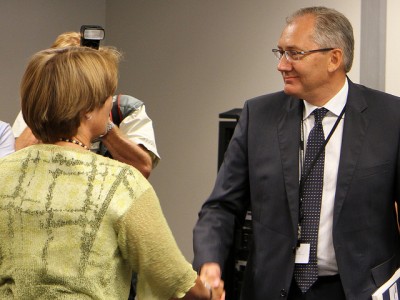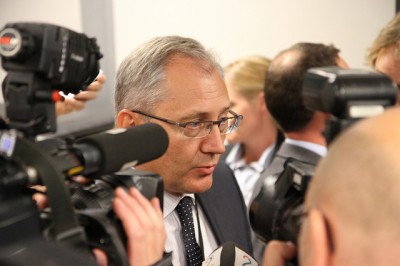Odd Reidar Humlegård officially started his new job as Norway’s acting director of the state police on Monday, promising new leadership and a faster pace of operational improvements. He’s taking over in the wake of crushing criticism over how Norwegian police work, and he’s been given widespread support to make changes.

Humlegård’s appointment following the resignation of Øystein Mæland Thursday night has been praised from both within police ranks and outside. He’s described as “solid, strong, knowledgable, results-oriented” and “a police leader who can push through major changes” in how Norwegian police operate.
He was the top choice of several officials in the Justice Ministry, which oversees the police in Norway, to succeed Mæland, who felt he no longer had the support of Justice Minister Grete Faremo and other government leaders. Mæland had only been on the job for a few weeks before a home-grown terrorist bombed government headquarters and unleashed a massacre on July 22 last year, but he took the fall for the harshly criticized emergency response to the attacks.
Now it’s Humlegård’s job to make changes quickly and he already seemed to have an agenda in place.
“We will quite quickly install new top leadership in the Directorate for Police using external resources,” Humlegård told reporters just before the weekend. “There will be several replacements and we’ll bring in external competence that perhaps has been lacking in the directorate until now.”

Humlegård, who’s worked for the police himself since 1984 and most recently has headed national crime unit Kripos, said that by building “a stronger and more competent leader group, I want to see a faster tempo and implementation of the changes that the July 22 Commission has proposed.”
He added that “we must also see this as an opportunity to do something about the situation that many have been aware of for a long time, regarding weaknesses with technological and communications systems.”
Humlegård specifically called for closer cooperation among Norway’s police districts, various police organizations and the state directorate.
Humlegård had said as late as Thursday afternoon, after Mæland had gathered the troops to discuss the critical report released last Monday by the government-appointed July 22 Commission, that he and other police officers had “full support” for Mæland. Just hours later, Mæland quit and Humlegård was summoned to step in. Humlegård, age 51 from Porsgrunn in Telemark, also has experience from the military in addition to the police, an advantage now that they’re supposed to start working together more closely.
The commission has demanded that the police acknowledge the risk they face in their jobs, show the ability to do their jobs and cooperate. Among the criticism emerging over the past week has been commission findings that some police officers seemed reluctant to head for the island of Utøya while shooting was underway and, as newspaper Dagsavisen reported on Monday, protected themselves and their own buildings after the bombing in Oslo before other public buildings including the Norwegian Parliament (Stortinget).
Police also failed to get their helicopter in the air, and staffing was short because many police officers were off on summer holiday when the attacks occurred. Police officers can now expect tougher training and more duty on weekends, holidays and at night, when most crimes actually occur.
“I think that most folks in the police realize this comprehensive (commission) report will be followed up,” Humlegård told newspaper Aftenposten. “I think there’s a common understanding of the criticism, that folks accept it and are willing to make changes. We must be better where we’re bad, but also realize that Norwegian police also do a lot of good.”
Views and News from Norway/Nina Berglund
Please support our news service. Readers in Norway can use our donor account. Our international readers can click on our “Donate” button:

